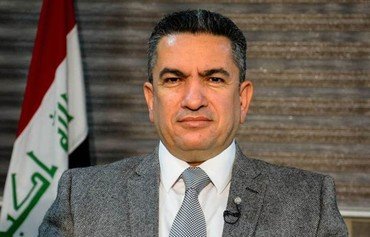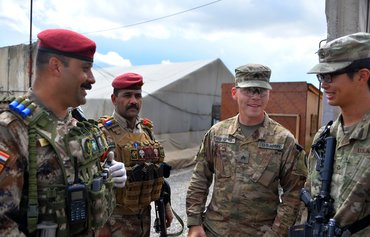Several pro-Iran Shia political parties have signaled their opposition to Iraqi premier-designate Adnan al-Zurfi, less than 24 hours after his nomination.
The 54-year-old lawmaker and former Najaf governor was nominated Tuesday (March 17th) to be Iraq's new prime minister, the second attempt to replace outgoing premier Adel Abdul Mahdi this year.
Al-Zurfi has 30 days to form a cabinet, which must earn a vote of confidence from Iraq's 329-member parliament.
Pro-Iran Shia blocs have announced their outright rejection of the decision to appoint al-Zurfi, with al-Fateh Alliance head Hadi al-Amiri calling it "unconstitutional".
"The constitution stipulates the appointment of the candidate from the largest bloc," al-Amiri said in a statement.
Al-Fateh Alliance was established ahead of the April 2018 parliamentary elections, and includes parties and Iran-aligned militias with a long history of backing an Iranian agenda, including Badr Organisation, Asaib Ahl al-Haq, Kataib Hizbullah and Imam Ali Brigades.
Thaer al-Bayati, secretary general of the Council of Arab Tribes in Salaheddine, told Diyaruna on Friday that the appointment of al-Zurfi was "appropriate, and within the outline of what the country's constitution stipulates".
The objections are "unjustified as al-Zurfi has not yet presented his cabinet, nor has he laid down the government's agenda", he said.
"They are a clear indication that Iran does not want al-Zurfi to head the next Iraqi government, since he does not maintain good relations with that country," he added.
"Al-Zurfi's statements and positions in recent months, especially with the escalating wave of popular protests, have rejected Iranian interference in Iraqi affairs and the militias' behaviour and influence," he added.
These parties "are showing once again their loyalty to Iran", he said. "They are launching a campaign against al-Zurfi instead of going to parliament and collecting a majority of votes to reject his mandate and choose an alternative."
Hopes for limiting arms, militias
"Al-Zurfi has good chances to overcome the controversy and see the task to completion, especially that he has the support of other Shia blocs as well as Sunni blocs and the Kurds," al-Bayati said.
In the first speech he gave after his appointment, al-Zurfi pledged to prepare for early elections within a year of forming his government.
He said he will implement a foreign policy based on the principle of "Iraq first", and avoid regional and international conflicts, develop the security and military establishment, continue to confront the remnants of the "Islamic State of Iraq and Syria" (ISIS), and protect popular demonstrations.
He also promised to work to "limit weapons to the state only, eliminate all armed displays, extend the state's authority and promote civil peace".
Al-Bayati said he is hopeful that al-Zurfi would succeed in "restraining militias and controlling weapons", stressing that it is a challenging task that would require time.
"However, with the support of security forces and the people, he will initiate the first steps and fulfill his pledges," he added.
"There are ongoing negotiations between al-Zurfi and the political parties supporting him on the one hand and the demonstrators on the other hand to discuss the demands pushed forward by the popular protests over the last several months," al-Bayati said.
"These negotiations are focused on public reforms, a fight against corruption and putting an end to external interference," he said.

![Iraqi Prime Minister designate Adnan al-Zurfi (R) was appointed March 17th by President Barham Saleh and tasked with forming a new government. [Photo via the Iraqi Presidency website]](/cnmi_di/images/2020/03/20/23113-Iraq-Adnan-Zurfi-600_384.jpg)






